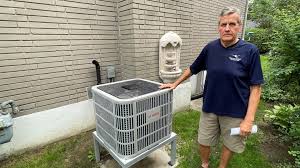Today, homeowners are deciding on heat pumps to warm or great their homes. Because they’re fairly new for the industry and quite different from conventional HVAC solutions, it is quite common for homeowners to experience a lot of queries about them. So, if you’re thinking of switching onto a power-efficient, dependable, and price-successful heating and chilling option, you have can come on the right place. In this particular manual, we’ll break down everything you need to know about heat pumps, including the direction they operate, their pros and cons, sorts, installation, maintenance, and troubleshooting suggestions.
What Exactly Are Heat Pumps and the way Will They Operate?
heat pump (tepelne cerpadlo) are heating, air flow, and air cooling (HVAC) solutions that shift heat from a location to an additional utilizing refrigerants to advance heat electricity into or out of your residence. As opposed to furnaces and ac units that create heat, heat pumps transport it. They work towards the thermodynamic principle that heats up frosty objects when heat is used directly to them and cools hot objects when heat is taken off from them.
Benefits and drawbacks of Heat Pumps
Just like any process, heat pumps feature advantages and disadvantages. Let us see what these are.
Benefits:
• Energy efficiency: They use significantly less electricity to make heat than other heating systems, helping you save money power bills.
• Two functionality: They may supply both heating and cooling down features, making them an all-purpose solution.
• Durability: There is a longer life-time than standard HVAC devices.
• Eco friendly: They generally do not release any greenhouse gases, which makes them an eco-warm and friendly solution.
Downsides:
• Original price: They are more expensive than standard HVAC solutions.
• May not operate in intense conditions: They could be unable to keep a room cozy in extremely cold temperature ranges.
• More space: They demand outdoor space to accommodate the pump.
Types of Heat Pumps
Heat pumps come in a number of varieties, each designed to fulfill diverse needs and operating circumstances.
Atmosphere-Source Heat Pumps:
These heat pumps get heat from outside oxygen, even just in conditions only -15 °C. They are the most everyday sort of heat pump in residential properties.
Geothermal Heat Pumps:
They draw out heat from the soil and offer far more steady heating and cooling down than oxygen-supply pumps. They are more expensive and might not be attainable in most properties.
Installment, Upkeep, and Troubleshooting
Heat pump installment calls for professional expertise and knowledge. You need to pick a competent licensed contractor to ensure an excellent installing. So far as maintenance is involved, you should retain the filters clean and the exterior model without any trash. Just before calling for professional help, there are several popular problems it is possible to troubleshoot, for instance a heat pump not switching on, not giving air flow, making unusual sounds, and very poor heating or cooling strength.
brief:
Heat pumps offer an electricity-efficient, eco-pleasant, and sturdy option for all of your heating and cooling requirements. By learning how they function, their types, advantages, and drawbacks, you possibly can make a well informed decision that best suits your property and spending budget. Make sure that you spouse with a licensed and skilled contractor to ensure a seamless installment and sustain your body regularly. Using this type of guide, you can go for a heat pump without having 2nd thoughts.


